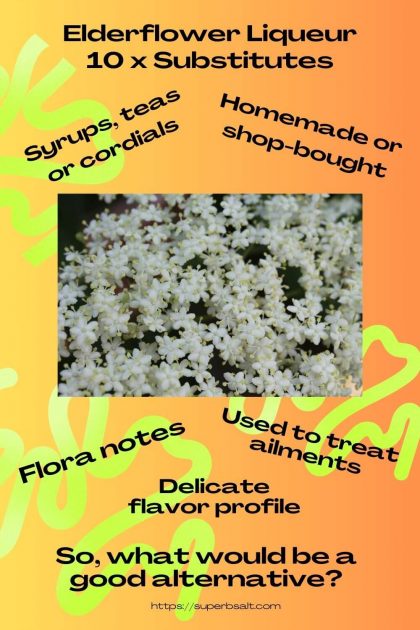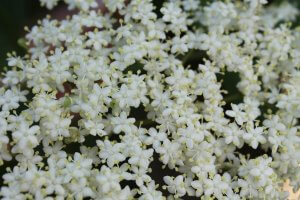What are the best Elderflower liqueur substitutes?
Elderflower liqueur has a delicate, floral sweetness that can instantly elevate cocktails and desserts. But if you don’t have a bottle on hand—or want a non-alcoholic option—you still have plenty of ways to capture its unique flavor. In this guide, we’ll walk through the best elderflower liqueur substitutes, both alcoholic and non-alcoholic, and when to use each one.
Quick Answer – What can I substitute for elderflower liqueur?
Try St-Germain, St-Elder, elderflower syrup, Italicus, lychee syrup, or lavender syrup. Each one brings those signature floral notes perfect for cocktails, desserts, and mocktails.

Okay, before we look at your Elderflower liqueur substitute options, let’s deal with that empty cupboard situation!
Where can I buy Elderflower liqueur?
If you want to be more prepared and ensure you don’t run out of elderflower liqueur, then you should stock up now.
Nowadays, most liqueur stores stock elderflower liqueur. Or if you prefer you can also purchase elderflower liqueur on-line.
We have included a link for a non-alcoholic Elderflower Syrup, which we hope you you like.
So why not jump on and place your order today.
STOCK UP NOW!
D’arbo Syrup Single Bottle Elderflower 500ml
A delicious syrup containing no artificial ingredents. Just open and pour.
Add to sparkling minerals, or even Procsecco to create delicious drinks. A small amount goes a long way!
1. St-Germain
When a recipe calls for elderflower liqueur, St-Germain is your top choice. It’s the original version made from handpicked elderflowers, offering a sweet, aromatic flavor.
Use it for: Classic cocktails like spritzes, gin and tonics, or champagne drinks.
Ratio: 1:1 substitution.
2. St-Elder
St-Elder is a more affordable take on St-Germain. It’s slightly sweeter and richer, which works beautifully in stronger or fruit-forward cocktails.
Use it for: Margaritas, lemon-based drinks, or dessert glazes.
Ratio: Start with ¾ of the original amount, then taste and adjust.
3. Elderflower Syrup or Cordial
If you want a non-alcoholic elderflower substitute, syrup or cordial is your best bet. It keeps the same floral character, perfect for mocktails or baked goods.
Use it for: Mocktails, frostings, or sparkling water spritzers.
Ratio: ½ to 1 part syrup for every 1 part liqueur.
4. Italicus Rosolio di Bergamotto
Looking for something floral with a citrusy edge? Italicus hits that balance. It’s a bergamot liqueur that offers bright, complex flavors similar to elderflower.
Use it for: Gin cocktails or recipes needing extra zest.
Ratio: 1:1 swap.
5. Lychee Syrup
Lychee syrup might surprise you, but its tropical, floral flavor mimics elderflower beautifully. It’s naturally sweet and alcohol-free.
Use it for: Mocktails, cakes, or sorbets.
Ratio: Use equal parts, or dilute slightly for lighter drinks.
6. Lavender or Rose Syrup
For another floral fix, lavender or rose syrup can stand in for elderflower. They bring a soft, botanical touch that feels fancy and aromatic.
Use it for: Cocktails, lemonades, or baked desserts.
Ratio: Start with half the amount and adjust to taste.
How to Choose the Right Substitute
- For cocktails: Use St-Germain, St-Elder, or Italicus for the closest match.
- For desserts: Syrups like elderflower, lychee, or lavender work beautifully.
- For mocktails: Go non-alcoholic with elderflower syrup or cordial, balanced with lemon juice or soda water.
FAQs
Liqueur has alcohol and a deeper, layered taste. Cordial is a sweet, non-alcoholic syrup—great for mocktails or desserts.
Elderflower syrup or cordial is your best choice. Lychee syrup or lavender syrup also add floral notes without alcohol.
Yes! Soak dried elderflowers in vodka for 1–2 days. Strain and sweeten with a little honey or sugar syrup for a homemade version.
Related Reads
Love finding flavor swaps? Check out:
FUN FACTS
1. Elderflower has been used for centuries in various cultures for both culinary and medicinal purposes. The Ancient Romans and Greeks used it to treat ailments such as colds and flu, while European folk medicine used elderflower to help break fevers. They were also used as an insect repellent back in the day!
2. Elderflower has a unique and delicate flavor. It is described as floral and slightly sweet taste and will add a refreshing twist to cocktails, desserts, and even savory dishes.
3. Elderflower has a rich cultural significance. In folklore, elder trees were believed to be sacred and were often associated with protection from evil spirits. It was customary to ask permission from the elder tree before harvesting its flowers or branches, and cutting down an elder tree was considered bad luck. Additionally, elderflower has been associated with celebrations and festivities, making it a symbol of renewal and vitality in many cultures.
4. Elderflower leaves are dark green and have sharp jagged edges. The leaves are normaly found in groups of five and when the leaves are crushed they release their strong scent.
We have gathered together a lot more facts on ingredients such as herbs, spices, oils, nuts, etc. if you would like to learn some more.
Or if you need to swap out another ingredient have a look at our Substitutes section.

